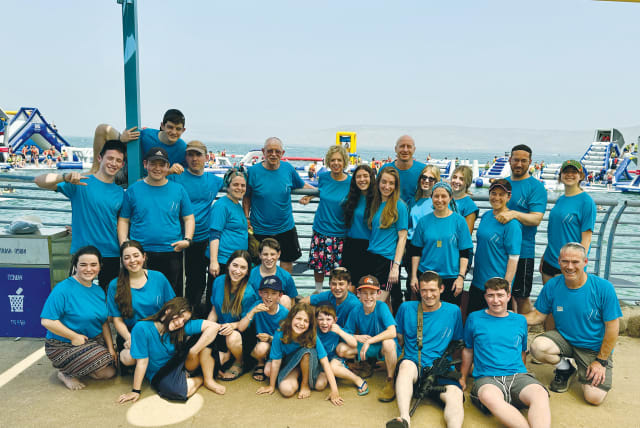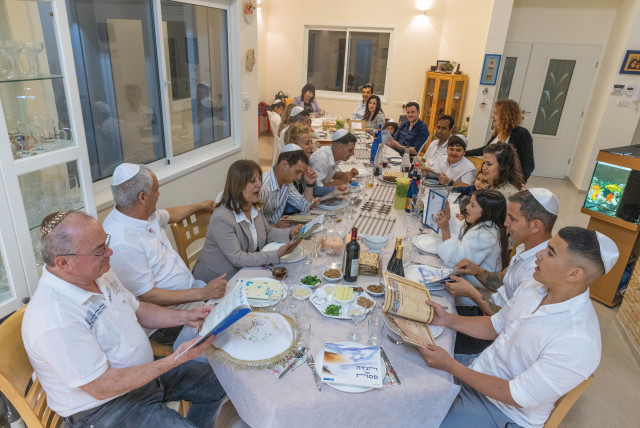How did Jews celebrate Passover during a war? - opinion

The story of the exodus of Jews from Egypt and of despots trying to destroy us has occurred in a sinusoidal pattern throughout history.
Millions of Jews and non-Jews participated in the Passover Seder this year and listened to the age-old question, “Why is this Night different from all other nights?” usually posed by the youngest member at the table. For many, the answer was obvious. With Israel involved in a bitter war, antisemitism raging in the United States and Europe, and more than 130 Jewish and non-Jewish hostages in the hands of Hamas and their terrorist co-conspirators, the atmosphere at the Seder was unprecedented in our lifetime.
How does one celebrate a joyous and meaningful holiday under the stresses and clouds of the bigotry that is currently perturbing our lives? This year, our family of approximately 30 members, ranging in age from two months to nearly 80 years, experienced Passover by meeting and celebrating with displaced persons in the South and North of Israel. It proved to be both a sobering and uplifting experience.
On the first day of hol hamoed (the intermediate days of Passover) we started early in the morning by visiting the site of the Nova music festival near the Re’im Forest which is about 5 km. from the Gaza border in southern Israel. This tranquil setting was the location of a dance/music event billed as a festival of “Friends, Love, and Infinite Freedom,” Nova was attended by more than 3,500 young Israelis. Their one goal; to enjoy life.
Instead, these poor souls were systematically shot at, kidnapped, and murdered. Rampaging, savage Palestinian terrorists, riding on motorcycles, herded the revelers into groups and butchered 340 participants. Cars of those fleeing were disabled and set on fire, with many burned alive.
As we stood in this now quiet forest filled with memorial pictures of the dead and kidnapped, tears welled up in our eyes. These tears are not symbols of weakness. They are symbols of our empathy for our fellow Jews and a sign of our determination to eradicate those responsible for this unprovoked massacre.
Moving on from the Nova site, we traveled to Bnei Netzarim, an agricultural moshav located about a kilometer from Gaza. There we packed gifts for Israeli soldiers and wrote notes of support. Old and young in our group participated and our efforts were soon realized when these packages were delivered to young soldiers manning an army base close to the moshav. At the army base we built swing sets for these soldiers so that they can relax when off duty. It was uplifting for us to see the joy on the faces of these courageous youngsters who are willing to sacrifice everything to protect farmers peacefully tending their crops.
Our guide at the army base, a religious carpenter, emphasized that our presence, along with that of the other volunteers, was the greatest gift and that Jewish unity was the magic ingredient needed to win the battles against Hamas and antisemitism. Of course, a few F16s and the Iron Dome also come in handy.
Leaving the army base, our crew drove over to Kibbutz Shlomit. This is a relatively new kibbutz in the southernmost part of the Gaza Strip, close to the Egyptian border. The kibbutz is about 12 years old and is green with lawns, trees, and small houses. Previously, it had been sand, sand dunes, and ladybugs. So much for displacing the “indigenous Palestinian” population.
Today, Shlomit grows more than 80 varieties of agricultural products. The kibbutz is populated by young, idealistic Jews who wish to work the holy soil. On October 7, despite a ceasefire between Hamas and Israel being in place, it was attacked by the Palestinian hordes.
While protecting their families and their neighboring communities, four members of Shlomit were killed. We listened to two of the widows share incredible stories of personal courage as well as their plans to rebuild what the terrorists had destroyed. Our family left Shlomit saddened by its losses and inspired by its spirit and the choice to live on for the sake of those who are no longer alive.
Leaving the South we made one last stop near Tkuma where a memorial is being constructed from the hundreds of cars that were shot at, burned, and blown up at the Nova festival. The memorial is a stark reminder of the devastation wreaked by Hamas on that infamous day.
ALTHOUGH NOT threatened by Israel, and despite a ceasefire agreement signed under United Nations Resolution 1701, Hezbollah launched a multifaceted rocket, missile, drone, and RPG attack against northern Israel, putatively in support of their Hamas brethren.
Displaced Israelis
This forced nearly 60,000 Israeli citizens to leave their homes and live with relatives, in hotels, or in rental units. These displaced Israelis are among the forgotten in Israel as the war enters its eighth month.
The Naider family felt it appropriate to demonstrate that we have not forgotten. Early on April 25, our troupe boarded a bus to visit Israelis displaced from along the northern border. We arranged for an afternoon of relaxation at a water park named Aqua Kef on Lake Kinneret.
Altogether, nearly 1,000 displaced Israelis enjoyed this floating water park. A barbecue with music and dancing for about 250 followed. Our daughter-in-law wrote “We always look forward to our annual visits to Israel to spend time with our family, but this year, it was extra meaningful. What impresses us so much about Israelis, and what the media fails to share, is the warmth, compassion, and resilience of these extraordinary people. Despite their prolonged absence from their homes, they were joyful, and we danced together, well into the night. In our discussions, they all expressed gratitude that people from America appreciated their predicament and showed their support. Despite the 104°F (40°C) temperature, we left Tiberias energized and determined to make sure the Jews of America remain united with their Israeli brothers and sisters.”
Our family is watching with unbelieving eyes the pictures of the chaos on the campuses of American Universities and trying to digest the acceptance of vile antisemitism and violent anti-establishment behavior being acted out throughout the US. We are concerned for the America we once knew and the future of its democracy. One of my children, a graduate of two Ivy League institutions, wrote, “We visited army bases and soldiers [including our two amazing nephews], who, contrary to the popular pernicious narrative sweeping our university campuses, remain determined to protect all civilian lives. ‘
Despite the inaccurate representations of this war, what struck me was the amount of aid I saw entering Gaza – dozens of Israeli trucks passing by when we were near the border with Egypt, and multiple American planes airdropping vehicle-sized packages via parachutes onto the Gazan beaches. I can’t imagine any other country at war demonstrating more humanitarian concern than Israel.”
Our celebration of Passover in Israel reinforced an important age-old lesson for our family. The story of the exodus of Jews from Egypt and of despots trying to destroy us has occurred in a sinusoidal pattern throughout history. Be it Pharaoh in Egypt, the murder of Jews during the Crusades, the Hitler-inspired Holocaust, the persecution of Jews in Stalin-led Russia, or the fanatical antisemitism of the Muslim Brotherhood-inspired Hamas, we know that as a family and as a people if we stand united we will ultimately succeed.
Am Yisrael Chai.
The writer is a distinguished emeritus professor of biochemistry and chemistry at the City University of New York. He lives in Rehovot and has two grandsons in the IDF. The opinions in this article are his own.
Jerusalem Post Store
`; document.getElementById("linkPremium").innerHTML = cont; var divWithLink = document.getElementById("premium-link"); if (divWithLink !== null && divWithLink !== 'undefined') { divWithLink.style.border = "solid 1px #cb0f3e"; divWithLink.style.textAlign = "center"; divWithLink.style.marginBottom = "15px"; divWithLink.style.marginTop = "15px"; divWithLink.style.width = "100%"; divWithLink.style.backgroundColor = "#122952"; divWithLink.style.color = "#ffffff"; divWithLink.style.lineHeight = "1.5"; } } (function (v, i) { });

